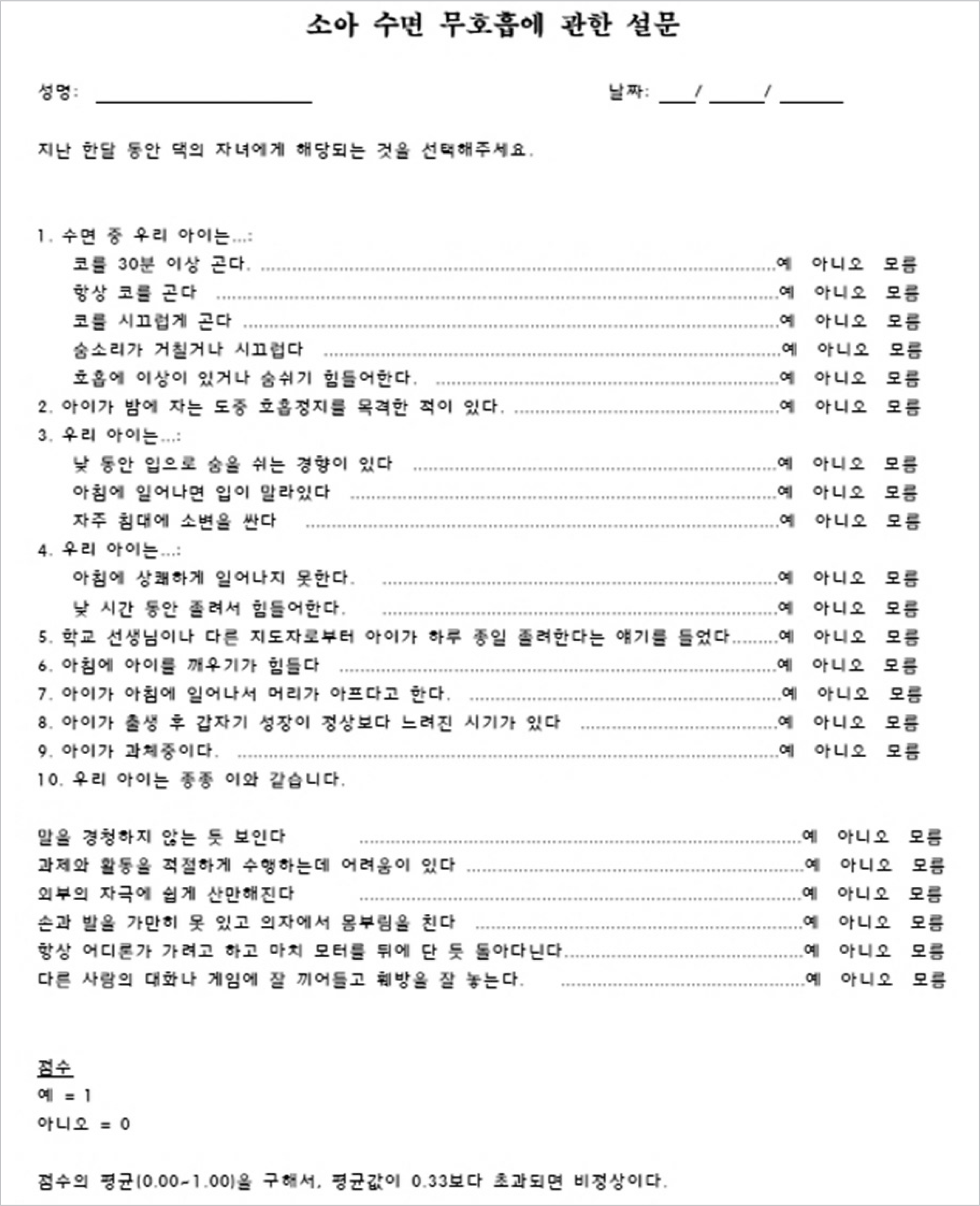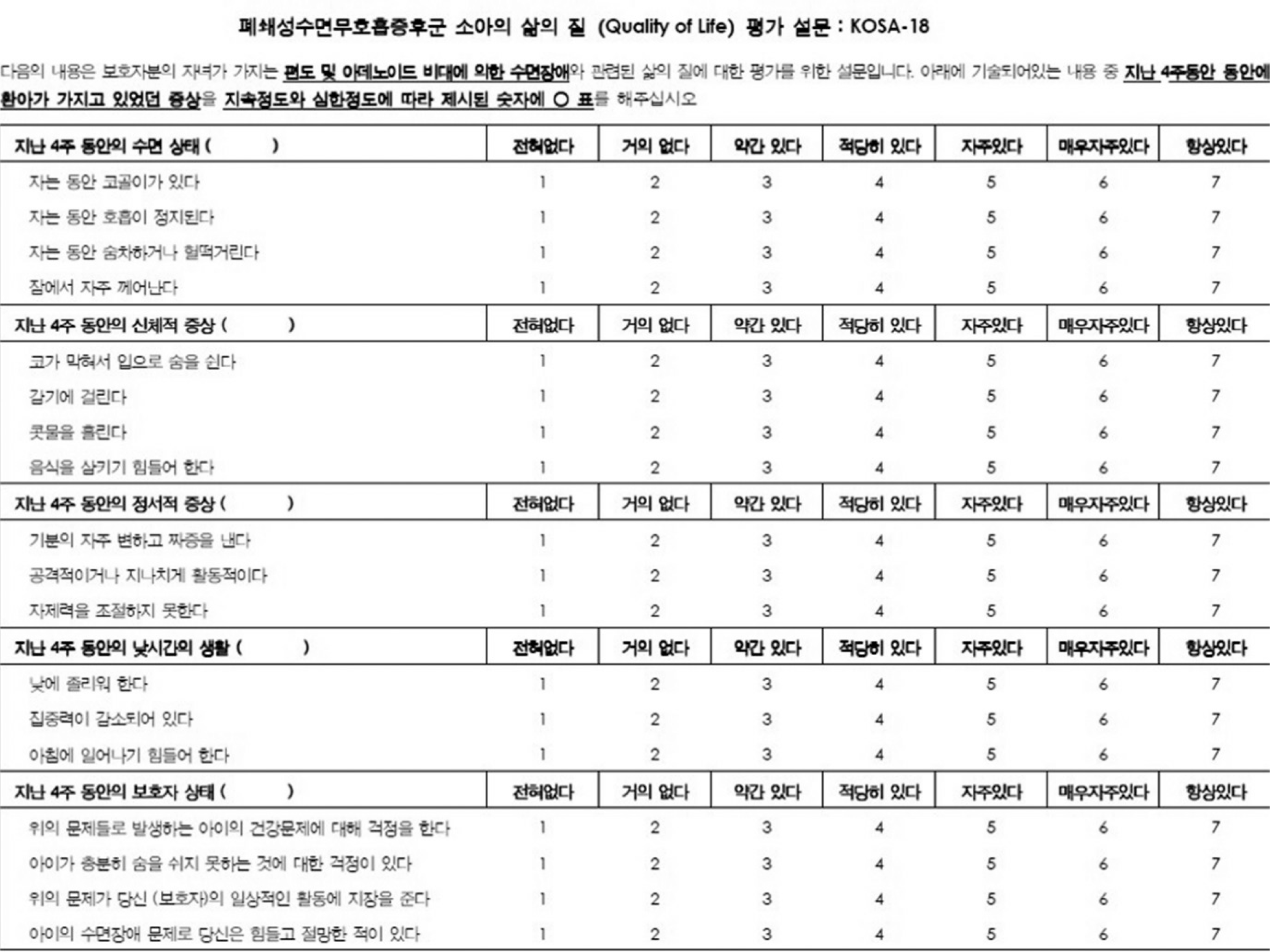Abstract
Obstructive sleep apnea syndrome (OSAS) is the most severe form of obstructive sleep-disordered breathing. It can produce cardio-vascular problems, growth retardation, cognitive deficits, and behavioral problems such as attention deficit/hyperactivity symptoms in children. The diagnostic gold standard for OSAS is overnight polysomnography, but it is expensive, time-consuming, and labor intensive, and is conducted by specialized centers which have trained personnel. Therefore, sleep questionnaires as screening tools for OSAS was developed. The benefits of sleep questionnaires are easy/quick application and low cost. The objective of this review is to describe several available pediatric sleep questionnaires which are helpful in screening OSAS.
Go to : 
References
1. Marcus CL, Brooks LJ, Draper KA, Gozal D, Halbower AC, Jones J, et al. Diagnosis and management of childhood obstructive sleep apnea syndrome. Pediatrics. 2012; 130:576–84.

2. Min YZ, Subbarao P, Narang I. The bidirectional relationship between asthma and obstructive sleep apnea: which came first? J Pediatr. 2016; 176:10–6.

3. Joosten KF, Larramona H, Miano S, Van Waardenburg D, Kaditis AG, Vandenbussche N, et al. How do we recognize the child with OSAS? Pediatr Pulmonol. 2017; 52:260–71.

4. Chervin RD, Hedger K, Dillon JE, Pituch KJ. Pediatric sleep questionnaire (PSQ): validity and reliability of scales for sleep-disordered breathing, snoring, sleepiness, and behavioral problems. Sleep Med. 2000; 1:21–32.

5. Franco RA Jr, Rosenfeld RM, Rao M. First place–resident clinical science award 1999. Quality of life for children with obstructive sleep apnea. Otolaryngol Head Neck Surg. 2000; 123(1 Pt 1):9–16.
6. Kaditis AG, Alonso Alvarez ML, Boudewyns A, Alexopoulos EI, Ersu R, Joosten K, et al. Obstructive sleep disordered breathing in 2- to 18-year-old children: diagnosis and management. Eur Respir J. 2016; 47:69–94.

7. Rosen CL, Wang R, Taylor HG, Marcus CL, Katz ES, Paruthi S, et al. Utility of symptoms to predict treatment outcomes in obstructive sleep apnea syndrome. Pediatrics. 2015; 135:e662–71.

8. Ehsan Z, Kercsmar CM, Collins J, Simakajornboon N. Validation of the pediatric sleep questionnaire in children with asthma. Pediatr Pulmonol. 2017; 52:382–9.

9. Villa MP, Paolino MC, Castaldo R, Vanacore N, Rizzoli A, Miano S, et al. Sleep clinical record: an aid to rapid and accurate diagnosis of paediatric sleep disordered breathing. Eur Respir J. 2013; 41:1355–61.

10. Borgström A, Nerfeldt P, Friberg D. Questionnaire OSA-18 has poor validity compared to polysomnography in pediatric obstructive sleep apnea. Int J Pediatr Otorhinolaryngol. 2013; 77:1864–8.

11. Lim HW, Lee SH, Lee HM, Choi JH, Kwon SY, Shin C, et al. Correlation between quality of life and indices of polysomnography in children with obstructive sleep apnea syndrome. Korean J Otolaryngol-Head Neck Surg. 2006; 49:35–40.
12. Seon SW, Jung JH, Lee SK, Lee SA, Lee E, Lee S, et al. Changes of sleep disordered breathing and quality of life after adenotonsillectomy in pediatric obstructive sleep apnea. Korean J Otorhinolaryngol-Head Neck Surg. 2017; 60:174–8.

13. Kadmon G, Chung SA, Shapiro CM. I'M SLEEPY: a short pediatric sleep apnea questionnaire. Int J Pediatr Otorhinolaryngol. 2014; 78:2116–20.

14. Burghard M, Brożek-Mądry E, Krzeski A. Sleep disordered breathing in children – Diagnostic questionnaires, comparative analysis. Int J Pediatr Otorhinolaryngol. 2019; 120:108–11.

15. Combs D, Goodwin JL, Quan SF, Morgan WJ, Parthasarathy S. Modified STOP-Bang tool for stratifying obstructive sleep apnea risk in adolescent children. PLoS One. 2015; 10:e0142242.

16. Owens JA, Spirito A, McGuinn M. The Children's Sleep Habits Questionnaire (CSHQ): psychometric properties of a survey instrument for school aged children. Sleep. 2000; 23:1043–51.
17. Oh EM, Eun SH, Park SH, Seo YS, Kim J, Seo WH, et al. Sleep disturbance in children with allergic disease. Allergy Asthma Respir Dis. 2015; 3:70–6.

18. Okada M, Kitamura S, Iwadare Y, Tachimori H, Kamei Y, Higuchi S, et al. Reliability and validity of a brief sleep questionnaire for children in Japan. J Physiol Anthropol. 2017; 36:35.

19. Mavroudi A, Chrysochoou EA, Boyle RJ, Trypsianis G, Xinias I, Cassimos D, et al. Validation of the Children's Sleep Habits Questionnaire in a sample of Greek children with allergic rhinitis. Allergol Immunopathol (Madr). 2018; 46:389–93.

20. Mitchell RB, Garetz S, Moore RH, Rosen CL, Marcus CL, Katz ES, et al. The use of clinical parameters to predict obstructive sleep apnea syndrome severity in children: the Childhood Adenotonsillectomy (CHAT) study randomized clinical trial. JAMA Otolaryngol Head Neck Surg. 2015; 141:130–6.
Go to : 
Table 1.
Comparison of pediatric sleep questionnaires for obstructive sleep disordered breathing
Table 2.
Variables of teen STOP-Bang questionnaire




 PDF
PDF ePub
ePub Citation
Citation Print
Print




 XML Download
XML Download